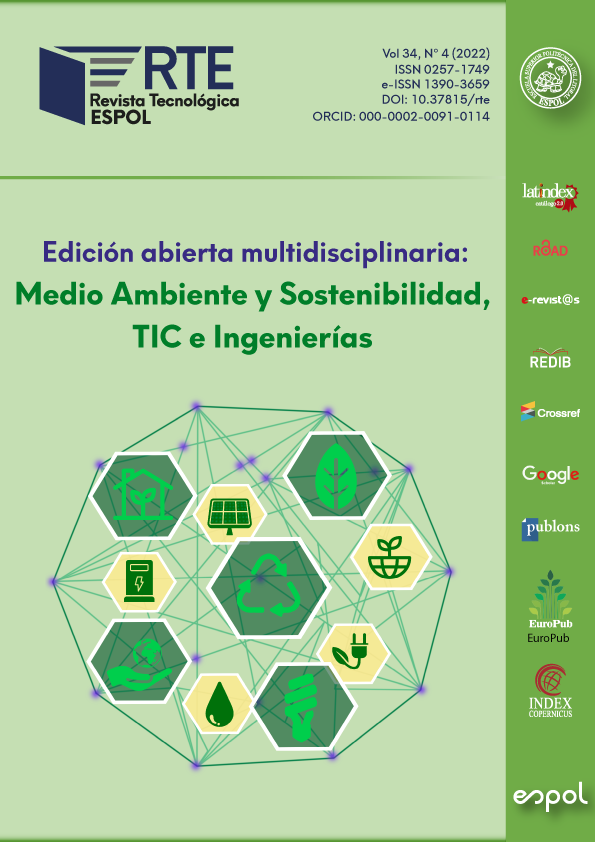Bananas are one of Ecuador's main export crops, constituting the most important agricultural activity in the country's economy. As with other crops, musacea production is subject to various phytosanitary problems that affect yields, for example, the black weevil (Cosmopolitos sordidus). It is an insect pest that attacks the root system affecting the vegetal’s normal absorption of nutrients and water. Severe attacks may even cause the plant to overturn. This study evaluates the efficiency of two variations of ethological traps using banana pseudostem for the black palm weevil control. These are the sandwich and V-type traps, located at heights of 25 cm, 50 cm, and 100 cm; they are considered the treatments. The evaluations were carried out from the third day after the installation of the traps, with five evaluations per treatment in total. The results showed that the best treatments were the traps placed at 25 cm, whereas the sandwich trap at 25 cm was the most effective treatment with an average specimen capture rate of 11.50 specimens. The highest efficiency was three days after its installation, with an average of 34 captures, decreasing in the last evaluation after 15 days with an average of 10.25 captures. The traps also captured specimens of the striped weevil (Metamasius hemipterus) and the palm weevil (Rhynchophorus palmarum).

This work is licensed under a Creative Commons Attribution-NonCommercial 4.0 International License.
References
Abagale, S. A., Woodcock, C. M., Chamberlain, K., Osafo-Acquaah, S., van Emden, H., Birkett, M. A., Pickett, J. A., & Braimah, H. (2019). Attractiveness of host banana leaf materials to the banana weevil, Cosmopolites sordidus in Ghana for development of field management strategies. Pest Management Science, 75(2), 549–555. https://doi.org/10.1002/PS.5182
Bajaña, G. B. (2019). Evaluación de trampas etológicas para el control de Cosmopolites sordidus en la plantación de banano (Mussa AAA) Cantón Puebloviejo. In Universidad Técnica de Babahoyo. http://dspace.utb.edu.ec/bitstream/handle/49000/7255/TE-UTB-FACIAG-ING AGROP-000091.pdf?sequence=1&isAllowed=y
Bakaze, E., Tinzaara, W., Gold, C., & Kubiriba, J. (2022). The Status of Research for the Management of the Banana Weevil, Cosmopolites sordidus (Germar) (Coleoptera: Curculionidae) in Sub-Saharan Africa. European Journal of Agriculture and Food Sciences, 4(2), 39–51. https://doi.org/10.24018/ejfood.2022.4.2.469
Berrú, M. A. E., Carpio, E. P., Álava, A. C., & Cevallos, H. V. (2021). Análisis de regulación del precio de la caja de banano en Ecuador período 2015- 2020. Revista Metropolitana de Ciencias Aplicadas, 4(S1), 210–217. http://remca.umet.edu.ec/index.php/REMCA/article/view/429
Bitencourt, V. C., dos Santos, A. T., Jario, L. C. M., Souza, C. L., de Oliveira, J. B., & de Oliveira, M. R. R. (2020). The use of UAVs in monitoring yellow sigatoka in banana. Biosystems Engineering, 193, 115–125. https://doi.org/10.1016/j.biosystemseng.2020.02.016
Espinosa, Y., Quevedo, J. N., & Gracía, R. M. (2019). Determinación de la eficiencia de diferentes trampas para el control de picudo negro (Cosmopolites Sordidus G.) en banano orgánico. Revista Científica Agroecosistemas, 7(1), 171–180. https://aes.ucf.edu.cu/index.php/aes/article/view/263
Galan, V., Rangel, A., Lopez, J., Hernandez, J. B. P., Sandoval, J., & Rocha, H. S. (2018). Propagación del banano: técnicas tradicionales, nuevas tecnologías e innovaciones. Revista Brasileira de Fruticultura, 40(4). https://doi.org/10.1590/0100-29452018574
Galvez, L. C., Barbosa, C. F. C., Koh, R. B. L., & Aquino, V. M. (2020). Loop-mediated isothermal amplification (LAMP) assays for the detection of abaca bunchy top virus and banana bunchy top virus in abaca. Crop Protection, 131(September 2019). https://doi.org/10.1016/j.cropro.2020.105101
García, D., Batista, I., Miranda, I., Pupiro, L., Reagalado, R., & Baños, H. (2022). Selección de trampas para la captura de Cosmopolites sordidus Germar Y Metamasius hemipterus L . competencia interespecífica Selection of traps to capture Cosmopolites sordidus Germar. Revista de Protección Vegetal, 37(1), 1–7.
Lazo-Roger, Y., Nivela-Morante, P. E., Rojas-Rojas, J. A., Taipe-Taipe, M. V., Piloso-Chávez, K. J., Pedraza-Gonzáles, X., Aragundi-Velarde, J. G., & Chavez, M. (2017). Evaluacio de trampas para capturar de picuroneghro (Cosmopolites sardidus Germar) en cultivo de plátano (Musa AAB cv. Hartón). El Misionero Del Agro, 8.
Magdama, F., Monserrate-Maggi, L., Serrano, L., Onofre, J. G., & Jiménez-Gasco, M. D. M. (2020). Genetic Diversity of Fusarium oxysporum f. sp. cubense, the Fusarium Wilt Pathogen of Banana, in Ecuador. Plants, 9(9), 1133. https://doi.org/10.3390/PLANTS9091133
Manrique-Silupu, J., Campos, J. C., Paiva, E., & Ipanaqué, W. (2021). Thrips incidence prediction in organic banana crop with Machine learning. Heliyon, 7(12), e08575. https://doi.org/10.1016/j.heliyon.2021.e08575
Membang, G., Ambang, Z., Mahot, H. C., Kuate, A. F., Fiaboe, K. K. M., & Hanna, R. (2020). Cosmopolites sordidus (Germar) susceptibility to indigenous Cameroonian Beauveria bassiana (Bals.) Vuill. and Metarhizium anisopliae (Metsch.) isolates. Journal of Applied Entomology, 144(6), 468–480. https://doi.org/10.1111/jen.12757
Mwaka, H. S., Christiaens, O., Bwesigye, P. N., Kubiriba, J., Tushemereirwe, W. K., Gheysen, G., & Smagghe, G. (2022). First Evidence of Feeding-Induced RNAi in Banana Weevil via Exogenous Application of dsRNA. Insects, 13(1). https://doi.org/10.3390/insects13010040
Palma-Jiménez, M., Blanco-Meneses, M., & Guillén-Sánchez, C. (2019). Mealybugs (Hemiptera: Pseudococcidae) and their impact on the Musaceae crop. Agronomy Mesoamerican, 30(1), 281–298. https://doi.org/10.15517/am.v30i1.32600
Quezada, R. X., Carvajal, H., & Barrezueta, S. (2021). Impacto económico de la producción bananera en el Ecuador en el periodo 2008-2016. Revista Metropolitana de Ciencias Aplicadas, 4(2), 148–157. http://remca.umet.edu.ec/index.php/REMCA/article/view/388
Regalado, J. G., Augusto, ;, Plaza, M., Christian, ;, & Sánchez, P. (2019). Amenazas de las manchas foliares de Sigatoka, Mycosphaerella spp., en la producción sostenible de banano en el Ecuador. Revista Verde de Agroecologia e Desenvolvimento Sustentável, ISSN-e 1981-8203, Vol. 14, No. 5, 2019 (Ejemplar Dedicado a: EDIÇÃO ESPECIAL), Págs. 591-596, 14(5), 591–596. https://doi.org/10.18378/rvads.v14i4.6623
Rojas, J. A., Maldonado, C. E., Meza, O. S., Lazo, R. Y., & Palacios, J. C. (2019). Uso de trampas con atrayentes para el monitoreo de Cosmopolites sordidus y Metamasius spp . en plátano barraganete Use of traps with attractants for the monitoring of Cosmopolites sordidus and Metamasius spp . in banana barragan. Centro Agricola, 46(2), 58–63. http://cagricola.uclv.edu.cu/
SIFA. (2022). Cifras Agroproductivas. Sistema de Información Pública Agropecuaria. http://sipa.agricultura.gob.ec/index.php/cifras-agroproductivas
Suarez, L., Suarez, J. E., & Monzón, V. (2021). Management of the banana weevil (Cosmopolites sordidus, Germar) Coleoptera: Curculionidae) with Beauveria bassiana, Bals and Vuils, Tonalá-Chinandega, Nicaragua. La Calera, 21(36), 30–35. https://doi.org/10.5377/calera.v21i36.11666
Thukkaram, D., Rajan, S., Manoharan, M., Gopal, R., Yadav, K., Kumar, S., Ahmad, I., Kumari, N., Mishra, V. K., & Jha, S. K. (2020). Biological Management of Banana Fusarium Wilt Caused by Fusarium oxysporum f. sp. cubense Tropical Race 4 Using Antagonistic Fungal Isolate CSR-T-3 (Trichoderma reesei). Frontiers in Microbiology, 11, 2900. https://doi.org/10.3389/FMICB.2020.595845/BIBTEX
Tresson, P., Tixier, P., Puech, W., & Carval, D. (2021). The challenge of biological control of Cosmopolites sordidus Germar (Col. Curculionidae): A review. Journal of Applied Entomology, 145(3), 171–181. https://doi.org/10.1111/jen.12868
Valverde, E., García, R. M., Moreno, A., & Socorro, A. R. (2019). Alternativas nutricionales eficientes en banano orgánico en la provincia El Oro, Ecuador. Revista Metropolitana de Ciencias Aplicadas, 2(1), 151–159. http://remca.umet.edu.ec/index.php/REMCA/article/view/104







